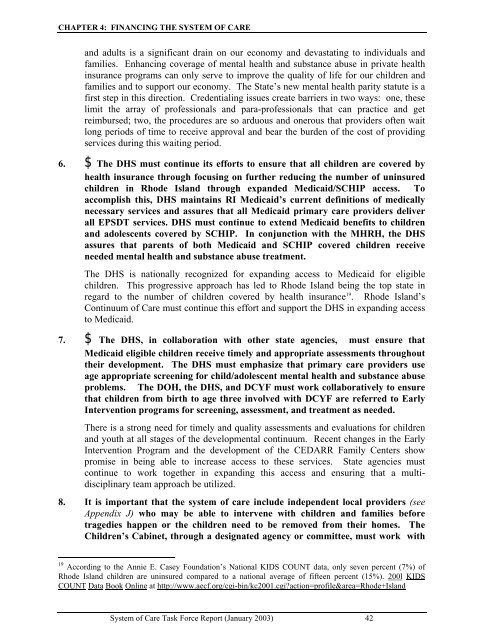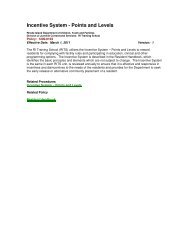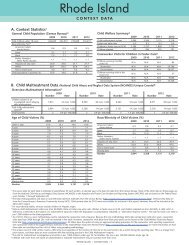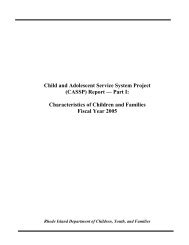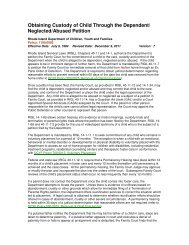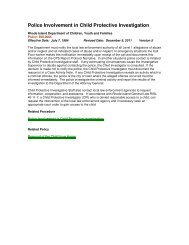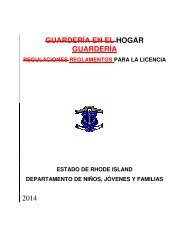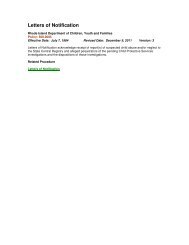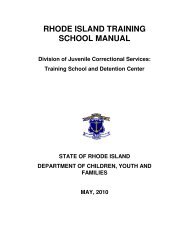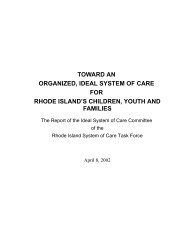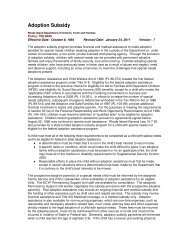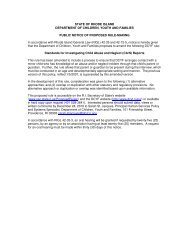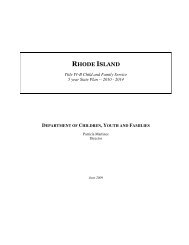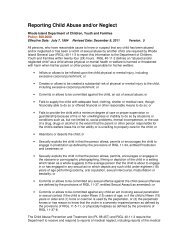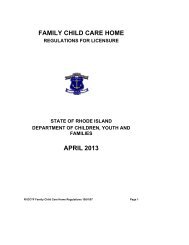Final Report - RI Department of Children, Youth & Families
Final Report - RI Department of Children, Youth & Families
Final Report - RI Department of Children, Youth & Families
You also want an ePaper? Increase the reach of your titles
YUMPU automatically turns print PDFs into web optimized ePapers that Google loves.
CHAPTER 4: FINANCING THE SYSTEM OF CARE<br />
and adults is a significant drain on our economy and devastating to individuals and<br />
families. Enhancing coverage <strong>of</strong> mental health and substance abuse in private health<br />
insurance programs can only serve to improve the quality <strong>of</strong> life for our children and<br />
families and to support our economy. The State’s new mental health parity statute is a<br />
first step in this direction. Credentialing issues create barriers in two ways: one, these<br />
limit the array <strong>of</strong> pr<strong>of</strong>essionals and para-pr<strong>of</strong>essionals that can practice and get<br />
reimbursed; two, the procedures are so arduous and onerous that providers <strong>of</strong>ten wait<br />
long periods <strong>of</strong> time to receive approval and bear the burden <strong>of</strong> the cost <strong>of</strong> providing<br />
services during this waiting period.<br />
6. $ The DHS must continue its efforts to ensure that all children are covered by<br />
health insurance through focusing on further reducing the number <strong>of</strong> uninsured<br />
children in Rhode Island through expanded Medicaid/SCHIP access. To<br />
accomplish this, DHS maintains <strong>RI</strong> Medicaid’s current definitions <strong>of</strong> medically<br />
necessary services and assures that all Medicaid primary care providers deliver<br />
all EPSDT services. DHS must continue to extend Medicaid benefits to children<br />
and adolescents covered by SCHIP. In conjunction with the MHRH, the DHS<br />
assures that parents <strong>of</strong> both Medicaid and SCHIP covered children receive<br />
needed mental health and substance abuse treatment.<br />
The DHS is nationally recognized for expanding access to Medicaid for eligible<br />
children. This progressive approach has led to Rhode Island being the top state in<br />
regard to the number <strong>of</strong> children covered by health insurance 19 . Rhode Island’s<br />
Continuum <strong>of</strong> Care must continue this effort and support the DHS in expanding access<br />
to Medicaid.<br />
7. $ The DHS, in collaboration with other state agencies, must ensure that<br />
Medicaid eligible children receive timely and appropriate assessments throughout<br />
their development. The DHS must emphasize that primary care providers use<br />
age appropriate screening for child/adolescent mental health and substance abuse<br />
problems. The DOH, the DHS, and DCYF must work collaboratively to ensure<br />
that children from birth to age three involved with DCYF are referred to Early<br />
Intervention programs for screening, assessment, and treatment as needed.<br />
There is a strong need for timely and quality assessments and evaluations for children<br />
and youth at all stages <strong>of</strong> the developmental continuum. Recent changes in the Early<br />
Intervention Program and the development <strong>of</strong> the CEDARR Family Centers show<br />
promise in being able to increase access to these services. State agencies must<br />
continue to work together in expanding this access and ensuring that a multidisciplinary<br />
team approach be utilized.<br />
8. It is important that the system <strong>of</strong> care include independent local providers (see<br />
Appendix J) who may be able to intervene with children and families before<br />
tragedies happen or the children need to be removed from their homes. The<br />
<strong>Children</strong>’s Cabinet, through a designated agency or committee, must work with<br />
19 According to the Annie E. Casey Foundation’s National KIDS COUNT data, only seven percent (7%) <strong>of</strong><br />
Rhode Island children are uninsured compared to a national average <strong>of</strong> fifteen percent (15%). 200l KIDS<br />
COUNT Data Book Online at http://www.aecf.org/cgi-bin/kc2001.cgi?action=pr<strong>of</strong>ile&area=Rhode+Island<br />
System <strong>of</strong> Care Task Force <strong>Report</strong> (January 2003) 42


